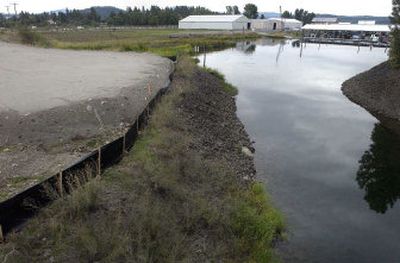Dredging project faces new hurdle

Duane Hagadone may have to do more tests to prove that dredging Blackwell Island won’t harm the environment.
U.S. Army Corps of Engineers experts are reviewing soil samples and other tests provided by Hagadone’s Marina Yacht Club LLC to determine if they have adequate information to decide whether to issue the company a permit.
The potential need for more extensive tests was raised by the U.S. Environmental Protection Agency in a July 20 letter stating it has “significant concerns” with the proposal to dredge the channel on the west side of the island to allow for larger boats.
“EPA is deeply concerned that the proposed activities could cause significant harm to Lake Coeur d’Alene and the Spokane River,” the letter stated, adding that the current information fails to demonstrate how the proposed dredging would prevent the release of heavy metals and other contaminants into the water.
The corps and the Idaho Department of Environmental Quality canceled today’s public meeting on the project until it’s known if more tests are warranted. It’s unclear if that meeting will be rescheduled.
The DEQ also is requesting an extension to finalize its water quality certification for the project.
Hagadone wants to dredge the channel on the west side of the island to allow for larger boats. The dredging would make the channel at the mouth of the Spokane River about 50 percent wider and at least 8 feet deep. The expansion would allow for about 530 boat slips, 29 more than are at the marina on the man-made island bisected by U.S. Highway 95.
John Olson of the EPA’s Boise office said the agency might not have received the latest changes to the marina project and that the corps must make sure all the testing is adequate.
“We are really concerned the technique they are proposing might not be able to protect water quality,” Olson said.
Besides further testing, the EPA wants the soil and silt to be removed when the channel is dry so there is less chance of releasing heavy metals into the water.
Hagadone’s engineer has already agreed to do most of the work in the dry. Jim Coleman said last month that workers would use dams to keep out the water. In some spots, closer to the mouth of the channel, crews would use silt fences to keep the potentially contaminated soils from escaping.
The EPA questions the use of the silt fences and prefers all the work to take place in the dry.
Hagadone had no specific comment Monday on the EPA concerns or the possible need for more testing.
“It’s just the process, and it just takes time,” Hagadone said.
The EPA also wants Hagadone to consider providing more fish habitat along the shoreline. Currently the company is proposing placing large rocks, or riprap, along nearly a mile of shoreline. The EPA suggests mixing the rock with stumps, logs and live vegetation.
Before work can start, Hagadone must get approval from the corps, the DEQ and the Idaho Department of Lands.
Last month the land department denied Hagadone’s request to dredge the Blackwell channel because of insufficient details about the project’s impact on water quality and fish habitat.
Department officials said that they needed the information in the DEQ’s draft water quality analysis but by law had to make a decision within 30 days of its June 9 public hearing. Once the DEQ finalizes the water quality certification, Hagadone officials will ask the lands department to reconsider its ruling.